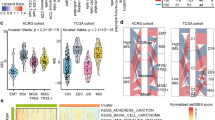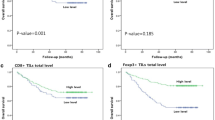Abstract
Background
The immune landscapes of gastrointestinal stromal tumors (GISTs) are still unclear. We aimed to explore the immune status of GISTs with different recurrence risks and sought potential immunotherapeutic targets.
Methods
Immune cell infiltration and the expression of 93 tumor markers of 65 GISTs with different recurrence risks from public datasets were analyzed via bioinformatic methods. Infiltrating immune cell and OX40L expression of 417 patients from the Zhongshan cohort were analyzed by immunohistochemistry and immunofluorescence. The clinicopathological data of the patients were collected and the prognostic factors were analyzed by univariate and multivariate methods.
Results
Macrophages, T cells and NK cells were the most abundant immune cells in tumor microenvironment. OX40L was the only differentially expressed marker in high- and low-risk patients, as well as in patients with primary and recurrent GIST. The positive rate of OX40L in GIST was 54%. OX40L was highly expressed in patients with no metastasis, low mitotic index and relapse risk. The amount of CD68 + macrophages was the independent factor of OX40L expression. The OX40L expression was positively correlated with M2 and resting mast cells. OX40L co-located with CD4 + T cells, M2 and activated mast cells. Patients with high OX40L levels experienced more prolonged relapse-free survival (RFS).
Conclusions
We first reported that GIST cells could express OX40L, patients with high OX40L experienced longer RFS. The colocalization of OX40L with immune cells indicates that OX40L could be a promising potential target for immunotherapy in GIST.






Similar content being viewed by others
References
Kindblom LG, Remotti HE, Aldenborg F, et al. Gastrointestinal pacemaker cell tumor (GIPACT): gastrointestinal stromal tumors show phenotypic characteristics of the interstitial cells of Cajal. Am J Pathol. 1998;152:1259–69.
Parab TM, DeRogatis MJ, Boaz AM, et al. Gastrointestinal stromal tumors: a comprehensive review. J Gastrointest Oncol. 2019;10:144–54.
Hemming ML, Heinrich MC, Bauer S, et al. Translational insights into gastrointestinal stromal tumor and current clinical advances. Ann Oncol. 2018;29:2037–45.
Boikos SA, Pappo AS, Killian JK, et al. Molecular subtypes of KIT/PDGFRA wild-type gastrointestinal stromal tumors: a report from the national institutes of health gastrointestinal stromal tumor clinic. JAMA Oncol. 2016;2:922–8.
Andersson J, Sihto H, Meis-Kindblom JM, et al. NF1-associated gastrointestinal stromal tumors have unique clinical, phenotypic, and genotypic characteristics. Am J Surg Pathol. 2005;29:1170–6.
Joensuu H, Roberts PJ, Sarlomo-Rikala M, et al. Effect of the tyrosine kinase inhibitor STI571 in a patient with a metastatic gastrointestinal stromal tumor. N Engl J Med. 2001;344:1052–6.
Demetri GD, van Oosterom AT, Garrett CR, et al. Efficacy and safety of sunitinib in patients with advanced gastrointestinal stromal tumour after failure of imatinib: a randomised controlled trial. Lancet. 2006;368:1329–38.
Demetri GD, Reichardt P, Kang YK, et al. Efficacy and safety of regorafenib for advanced gastrointestinal stromal tumours after failure of imatinib and sunitinib (GRID): an international, multicentre, randomised, placebo-controlled, phase 3 trial. Lancet. 2013;381:295–302.
Janku F, Abdul Razak AR, Chi P, et al. Switch control inhibition of KIT and PDGFRA in patients with advanced gastrointestinal stromal tumor: a phase i study of ripretinib. J Clin Oncol. 2020;38:3294–303.
Ray K. Ripretinib for advanced gastrointestinal stromal tumours. Nat Rev Gastroenterol Hepatol. 2020;17:452.
Reck M, Remon J, Hellmann MD. First-line immunotherapy for non-small-cell lung cancer. J Clin Oncol. 2022;40:586–97.
Sangro B, Sarobe P, Hervas-Stubbs S, et al. Advances in immunotherapy for hepatocellular carcinoma. Nat Rev Gastroenterol Hepatol. 2021;18:525–43.
Thoma C. Kidney cancer: combining targeted and immunotherapy. Nat Rev Urol. 2018;15:263.
Finck AV, Blanchard T, Roselle CP, et al. Engineered cellular immunotherapies in cancer and beyond. Nat Med. 2022;28:678–89.
Adusumilli PS, Zauderer MG, Riviere I, et al. A phase I trial of regional mesothelin-targeted CAR T-cell therapy in patients with malignant pleural disease, in combination with the anti-PD-1 agent pembrolizumab. Cancer Discov. 2021;11:2748–63.
Sun X, Shu P, Fang Y, et al. Clinical and prognostic significance of tumor-infiltrating CD8+ T cells and PD-L1 expression in primary gastrointestinal stromal tumors. Front Oncol. 2021;11: 789915.
Sun X, Sun J, Yuan W, et al. Immune cell infiltration and the expression of PD-1 and PD-L1 in primary PDGFRA-mutant gastrointestinal stromal tumors. J Gastrointest Surg. 2020. https://doi.org/10.1007/s11605-020-04860-8.
van Dongen M, Savage ND, Jordanova ES, et al. Anti-inflammatory M2 type macrophages characterize metastasized and tyrosine kinase inhibitor-treated gastrointestinal stromal tumors. Int J Cancer. 2010;127(4):899–909.
Cameron S, Gieselmann M, Blaschke M, et al. Immune cells in primary and metastatic gastrointestinal stromal tumors (GIST). Int J Clin Exp Pathol. 2014;7:3563–79.
Rusakiewicz S, Semeraro M, Sarabi M, et al. Immune infiltrates are prognostic factors in localized gastrointestinal stromal tumors. Can Res. 2013;73:3499–510.
Balachandran VP, Cavnar MJ, Zeng S, et al. Imatinib potentiates antitumor T cell responses in gastrointestinal stromal tumor through the inhibition of Ido. Nat Med. 2011;17:1094–100.
Chen LL, Chen X, Choi H, et al. Exploiting antitumor immunity to overcome relapse and improve remission duration. Cancer Immunol Immunother. 2012;61:1113–24.
Sun C, Mezzadra R, Schumacher TN. Regulation and function of the PD-L1 checkpoint. Immunity. 2018;48:434–52.
Feng M, Jiang W, Kim BYS, et al. Phagocytosis checkpoints as new targets for cancer immunotherapy. Nat Rev Cancer. 2019;19:568–86.
Newman AM, Liu CL, Green MR, et al. Robust enumeration of cell subsets from tissue expression profiles. Nat Methods. 2015;12:453–7.
Joensuu H, Vehtari A, Riihimaki J, et al. Risk of recurrence of gastrointestinal stromal tumour after surgery: an analysis of pooled population-based cohorts. Lancet Oncol. 2012;13:265–74.
El-Menyar A, Mekkodathil A, Al-Thani H. Diagnosis and management of gastrointestinal stromal tumors: an up-to-date literature review. J Cancer Res Ther. 2017;13:889–900.
Burch J, Ahmad I. Gastrointestinal stromal cancer. Treasure Island: StatPearls; 2022.
Lu X. OX40 and OX40L interaction in cancer. Curr Med Chem. 2021;28:5659–73.
Deng J, Zhao S, Zhang X, et al. OX40 (CD134) and OX40 ligand, important immune checkpoints in cancer. Onco Targets Ther. 2019;12:7347–53.
Kim MY, Gaspal FM, Wiggett HE, et al. CD4(+)CD3(-) accessory cells costimulate primed CD4 T cells through OX40 and CD30 at sites where T cells collaborate with B cells. Immunity. 2003;18:643–54.
Gracias DT, Sethi GS, Mehta AK, et al. Combination blockade of OX40L and CD30L inhibits allergen-driven memory TH2 cell reactivity and lung inflammation. J Allergy Clin Immunol. 2021;147:2316–29.
Zhang X, Xiao X, Lan P, et al. OX40 costimulation inhibits Foxp3 expression and treg induction via BATF3-dependent and independent mechanisms. Cell Rep. 2018;24:607–18.
Piconese S, Valzasina B, Colombo MP. OX40 triggering blocks suppression by regulatory T cells and facilitates tumor rejection. J Exp Med. 2008;205:825–39.
Voo KS, Bover L, Harline ML, et al. Antibodies targeting human OX40 expand effector T cells and block inducible and natural regulatory T cell function. J Immunol. 2013;191:3641–50.
Ye K, Li F, Wang R, et al. An armed oncolytic virus enhances the efficacy of tumor-infiltrating lymphocyte therapy by converting tumors to artificial antigen-presenting cells in situ. Mol Ther. 2022. https://doi.org/10.1016/j.ymthe.2022.06.010.
Song M, Gao J, Yan T, et al. Hsa_circ_0000652 aggravates inflammation by activation of macrophages and enhancement of OX40/OX40L interaction in ankylosing spondylitis. Front Cell Dev Biol. 2021;9: 737599.
Acknowledgements
The authors thank all individuals who participated in this study and donated samples.
Funding
This work was supported by grants from the National Natural Science Foundation of China (82003184 and 82071763).
Author information
Authors and Affiliations
Contributions
All authors searched the literature, designed the study, interpreted the findings and revised the manuscript. QZ, XS, XG and KS: carried out data management and statistical analysis and drafted the manuscript. YH, XG, KS, XQ: helped with cohort identification and data management. QZ, XG and KS: performed project administration.
Corresponding authors
Ethics declarations
Conflict of interest
The authors declare that they have no conflict of interest.
Consent for publication
Not applicable.
Additional information
Publisher's Note
Springer Nature remains neutral with regard to jurisdictional claims in published maps and institutional affiliations.
Supplementary Information
Below is the link to the electronic supplementary material.
Rights and permissions
Springer Nature or its licensor (e.g. a society or other partner) holds exclusive rights to this article under a publishing agreement with the author(s) or other rightsholder(s); author self-archiving of the accepted manuscript version of this article is solely governed by the terms of such publishing agreement and applicable law.
About this article
Cite this article
Zhang, Q., Sun, X., Hou, Y. et al. New insight on the correlation of immune landscapes with immune markers expression in different risk classification of gastrointestinal stromal tumors. J Gastroenterol 58, 527–539 (2023). https://doi.org/10.1007/s00535-023-01981-0
Received:
Accepted:
Published:
Issue Date:
DOI: https://doi.org/10.1007/s00535-023-01981-0




